Don't flap, raise your hands! Finalists of bird photography competition revealed
The Bird Photographer of the Year 2022 finalist preview showcases images from the popular contest dedicated to birds
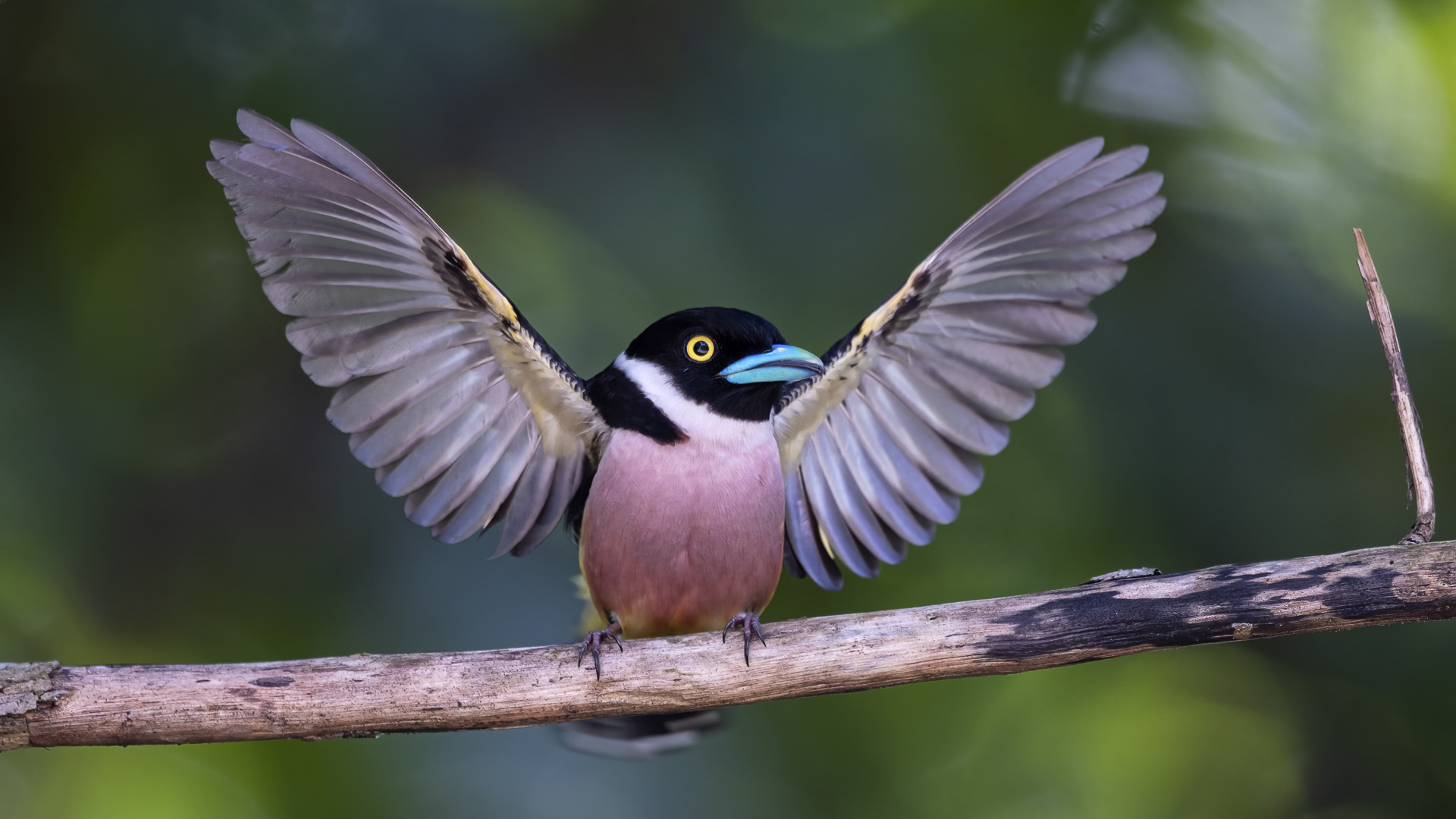
The best camera deals, reviews, product advice, and unmissable photography news, direct to your inbox!
You are now subscribed
Your newsletter sign-up was successful
Bird Photographer of the Year is a massive annual photography contest in the birding calendar, and this year more than 20,000 images were entered from 115 countries around the world. There's a £5,000 cash prize, but passionate photographers also compete for the prestigious title alone.
“Birds are an incredibly diverse group of animals, and we’ve seen stunning images of everything from mallard ducks to harpy eagles this year,” says Will Nicholls, wildlife cameraman and Director at Bird Photographer of the Year. “We celebrate birds and conservation through images, and it is always a pleasure for everyone on the judging panel to see the work of such talented photographers.”
• What's the best camera for wildlife photography?
BPOTY is now in its seventh year, and the funds raised from the competition go towards important bird conservation projects.
The finalist preview has been announced – see the diverse range of images below – and the overall winner will be announced from this selection on 8 September 2022. Who will it be? And what's your favorite image? Let us know!
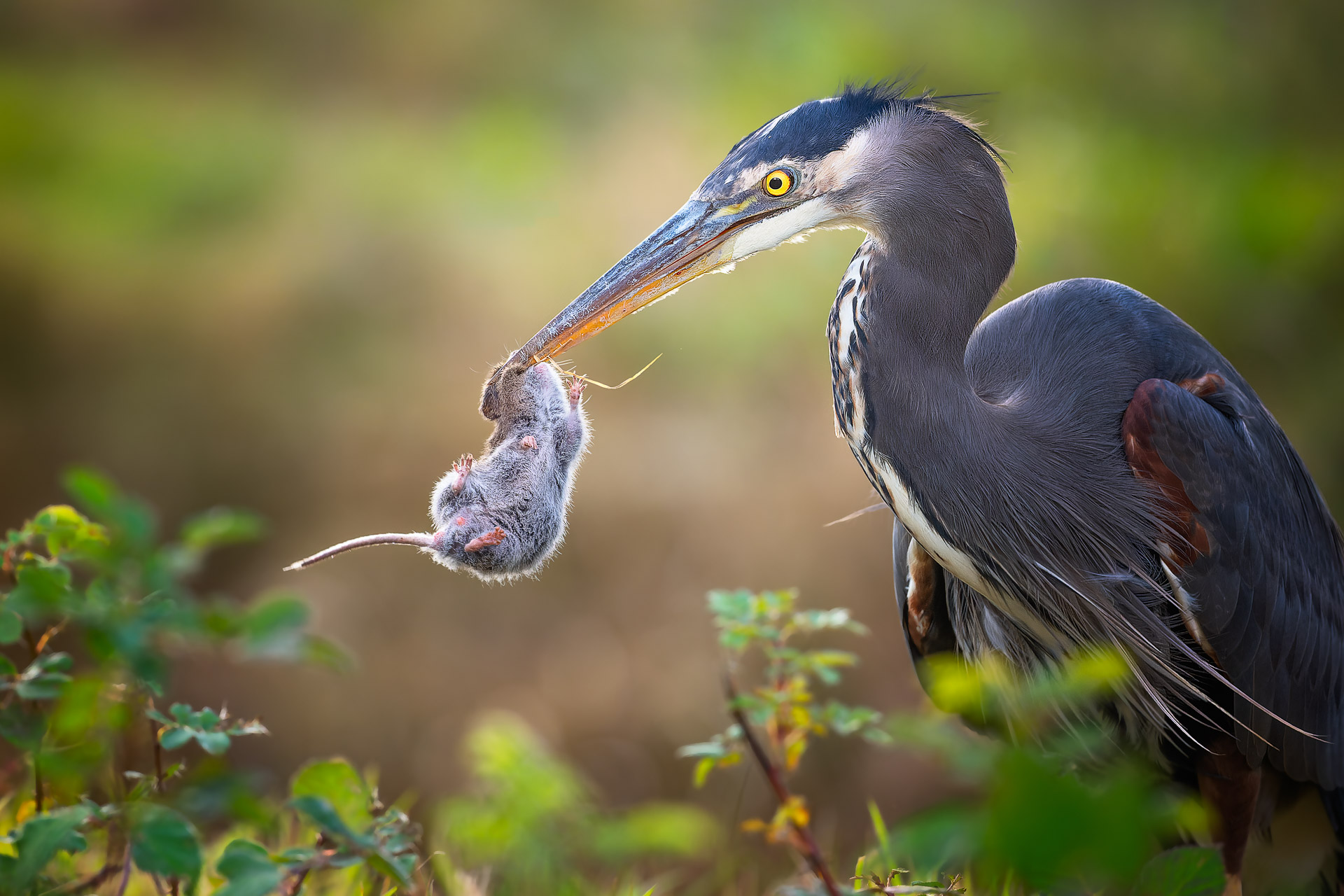
I’d spent a good portion of the year photographing Great Blue Herons, which is the official bird of my home town, Seattle. I had just taken possession of a brand-new lens and wanted to try something different, so I pulled off the road to observe a heron in afield. Until that point, I had been photographing these birds exclusively in the vicinity of water. I was shocked when the bird pulled up a vole and I literally had to force myself to keep photographing. Some will find this image too gruesome to look at, and the heron’s choice of prey will come as a surprise to many. It really should not: we humans devour other mammals, as well as birds, after all.
Taken on a Nikon Z 6 with Nikon 500mm f/5.6 PF lens. Focal length 500mm; 1/3,200 second; f/5.6; ISO 2,800
The best camera deals, reviews, product advice, and unmissable photography news, direct to your inbox!
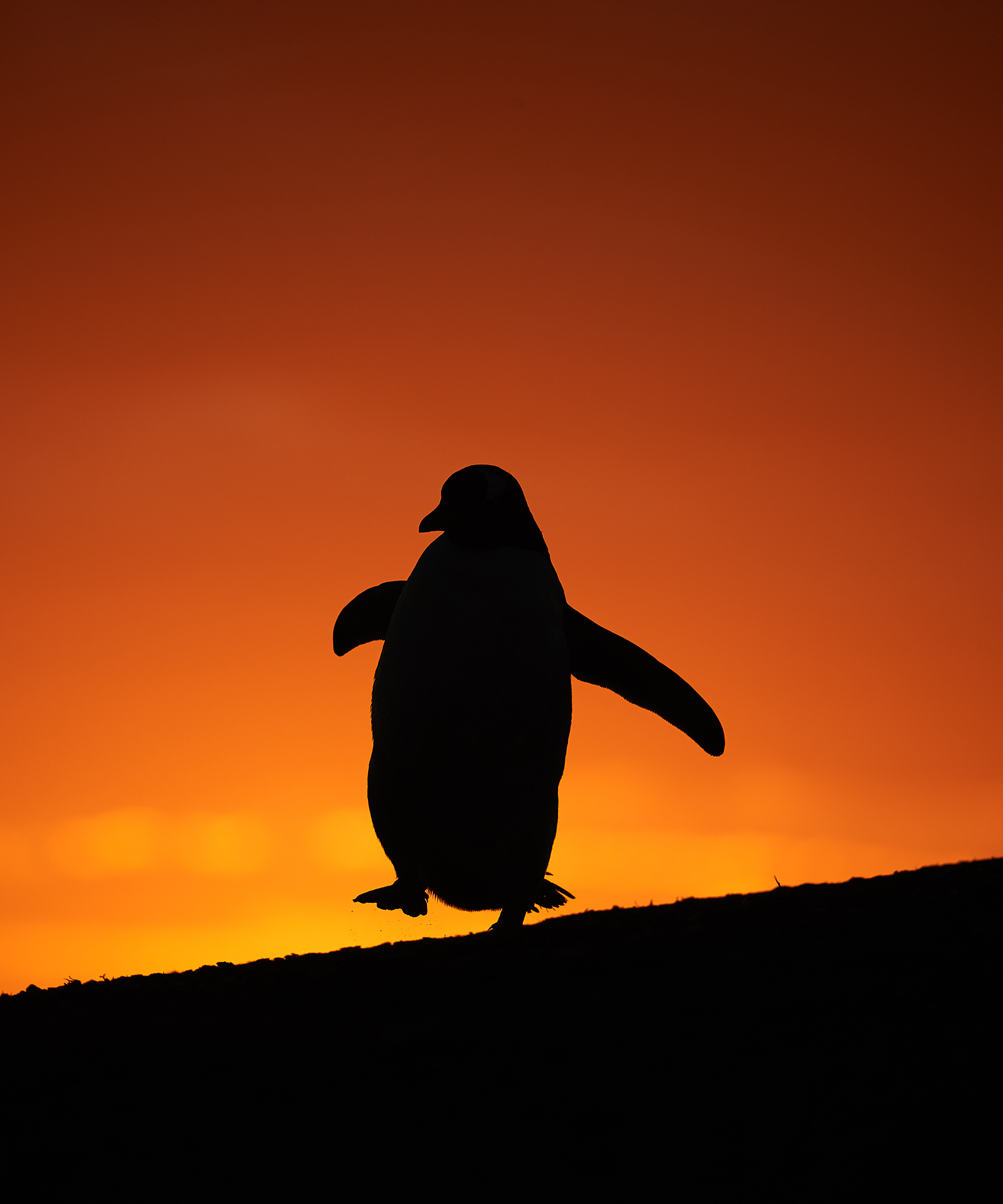
In the light of the setting sun, this penguin almost looked as if it were dancing. I positioned myself lying on the ground, waiting and hoping for a suitable penguin to pass during the few minutes when the setting sun created ideal light for a silhouette.This penguin obliged, with beak, feet and flippers nicely placed as it went past. I intentionally underexposed the image slightly to enhance the colors of the sunset against the silhouetted penguin.
Taken on a Canon EOS-1D X Mark II with Canon 100–400mm f/4.5– 5.6 II lens. Focal length 371mm; 1/1,600 second; f/5.6; ISO 100
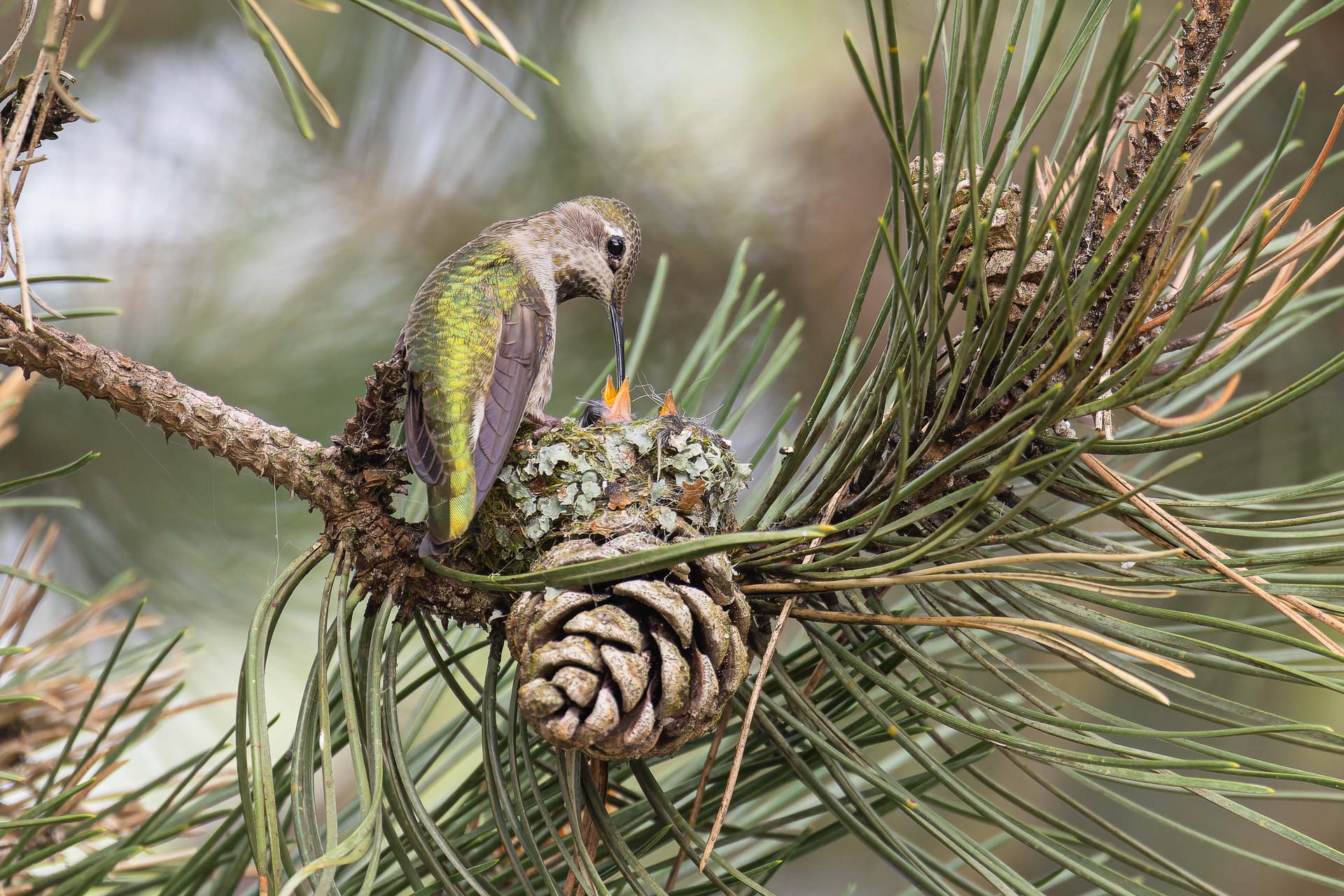
During the Covid-19 pandemic, travel restrictions meant that my photographic pursuits were limited to my immediate neighborhood for quite some time. I decided I would take the opportunity to get to know my local area in Vancouver as well as possible. Each morning, I ventured out to a local park, searching for birds and wildlife. Over the course of the spring, I managed to locate sevenAnna’s Hummingbird nests in the area. Not wanting to disturb the birds in this important and sensitive stage of their life cycle, I would stay an appropriate distance from the nests and limit my visits to a maximum of 15 minutes. I had been checking in on this particularly beautiful nest for a couple of weeks, as a hummingbird worked hard to build it and incubate her eggs. I was delighted when I stopped by one afternoon and saw two tiny beaks poking out of the tiny nest! When their mother flew in to feed them, I captured this intimate moment.
Taken on a Canon R5 with Canon 100–400mm f/4.5–5.6 II lens and 1.4×teleconverter. Focal length 560mm; 1/160 second; f/8; ISO 800
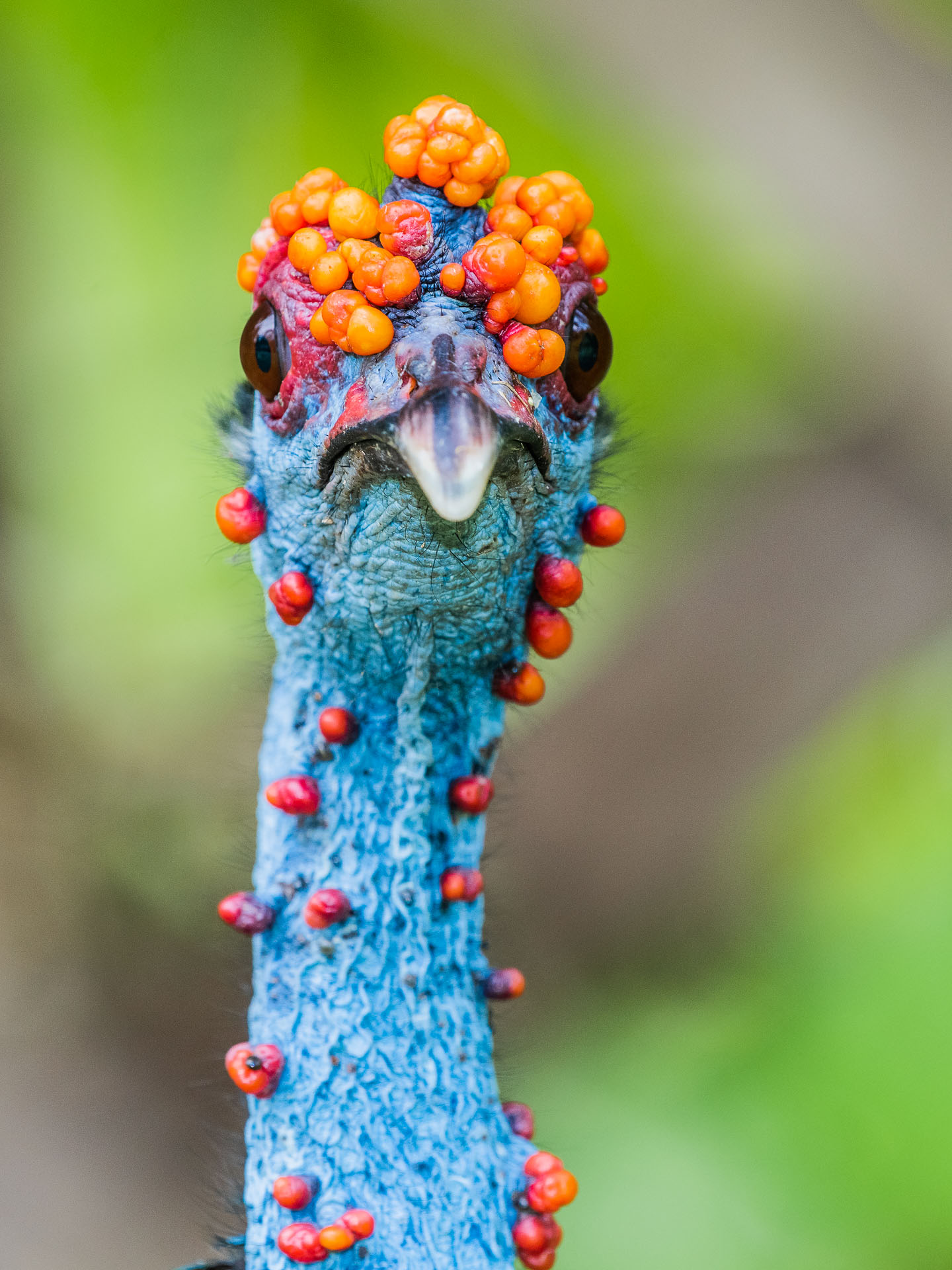
The colors and structures on the head of a male Ocellated Turkey surpass even those of its closes trelative, the Wild Turkey (Meleagris gallopavo) of North America. I always wonder whether the orange warts that cover the head and neck could serve any other purpose than sexual selection– they seem so extravagant. To show the birds in a different way than is seen usually, I chose this head-on view when this individual made eye contact with me in a private reserve in Belize.
Taken on a Nikon D810 with Nikon 200–500mm f/5.6 lens. Focal length 500mm; 1/250 second; f/6.3; ISO500

It was the start of the breeding season, and this Black-and-yellow Broadbill was making a lot of commotion in an attempt to attract a mate. The courtship behavior included a lot of noisy vocalization and attention-seeking wing-spreading. To my eyes the plumage colors and patterns are like those an artist would use to illustrate a cartoon – stylized and somehow not quite like a real bird.
Taken with a Fujifilm X-T4 with Canon 500mm f/4 II lens. Focal length 500mm; 1/250second; f/4.5; ISO 400
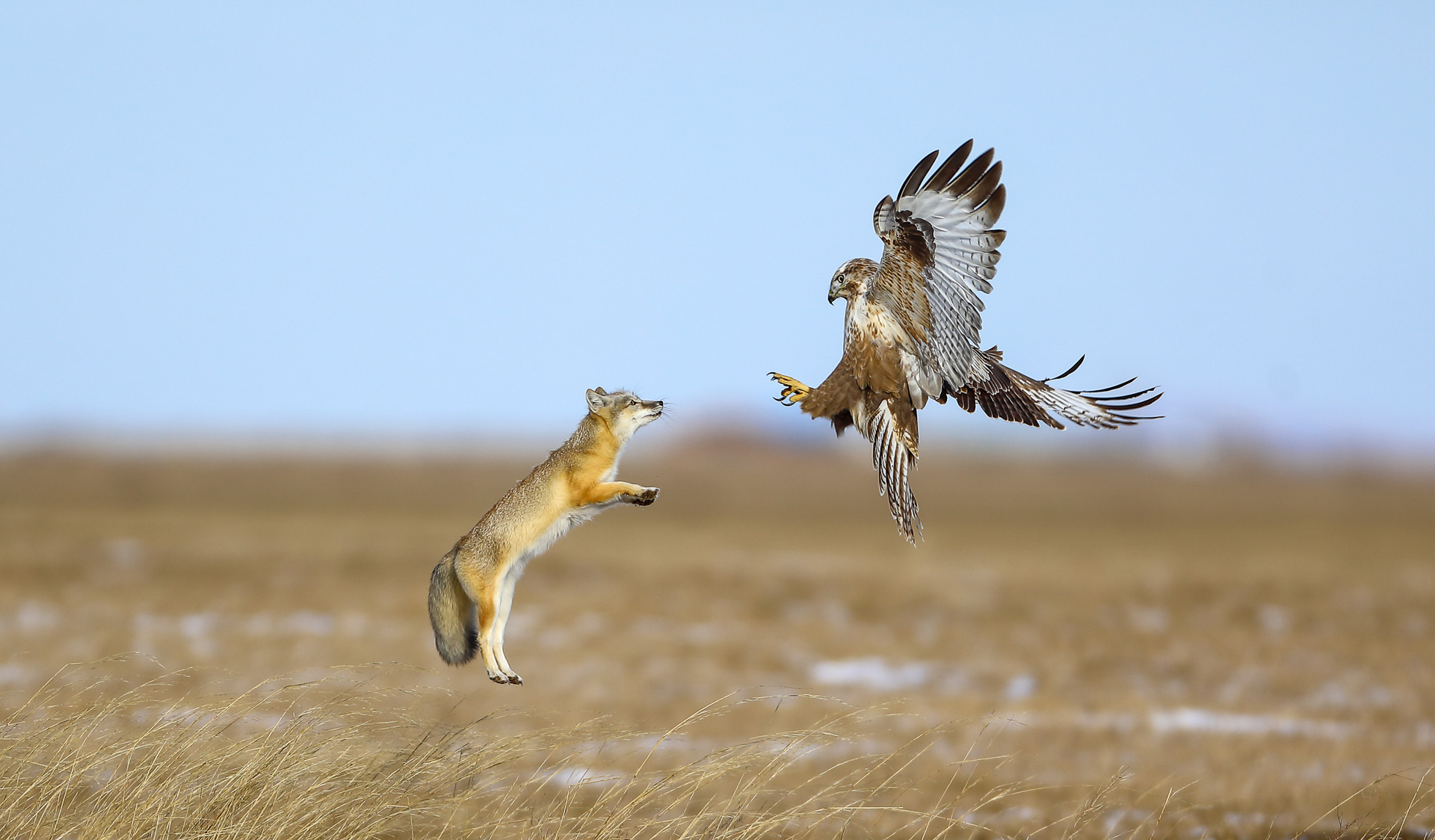
This photograph was taken on the Mandu grasslands of Dongwu Banner in InnerMongolia. Both Upland Buzzard and Corsac Fox (Vulpes corsac) are top predators in this grassy environment and share a diet that comprises mainly small rodents. Consequently, in terms of feeding they are rivals and are sometimes driven to fight each other over food. This kind of confrontation is usually for show and a battle of will that never ends up with life-and-death conflict. In this instance, the Upland Buzzard decided to relinquish its food and fly away.
Canon EOS 5D Mark IV with Canon 600mm f/4 lens. Focal length 600mm; 1/1,600 second; f/4, ISO 160
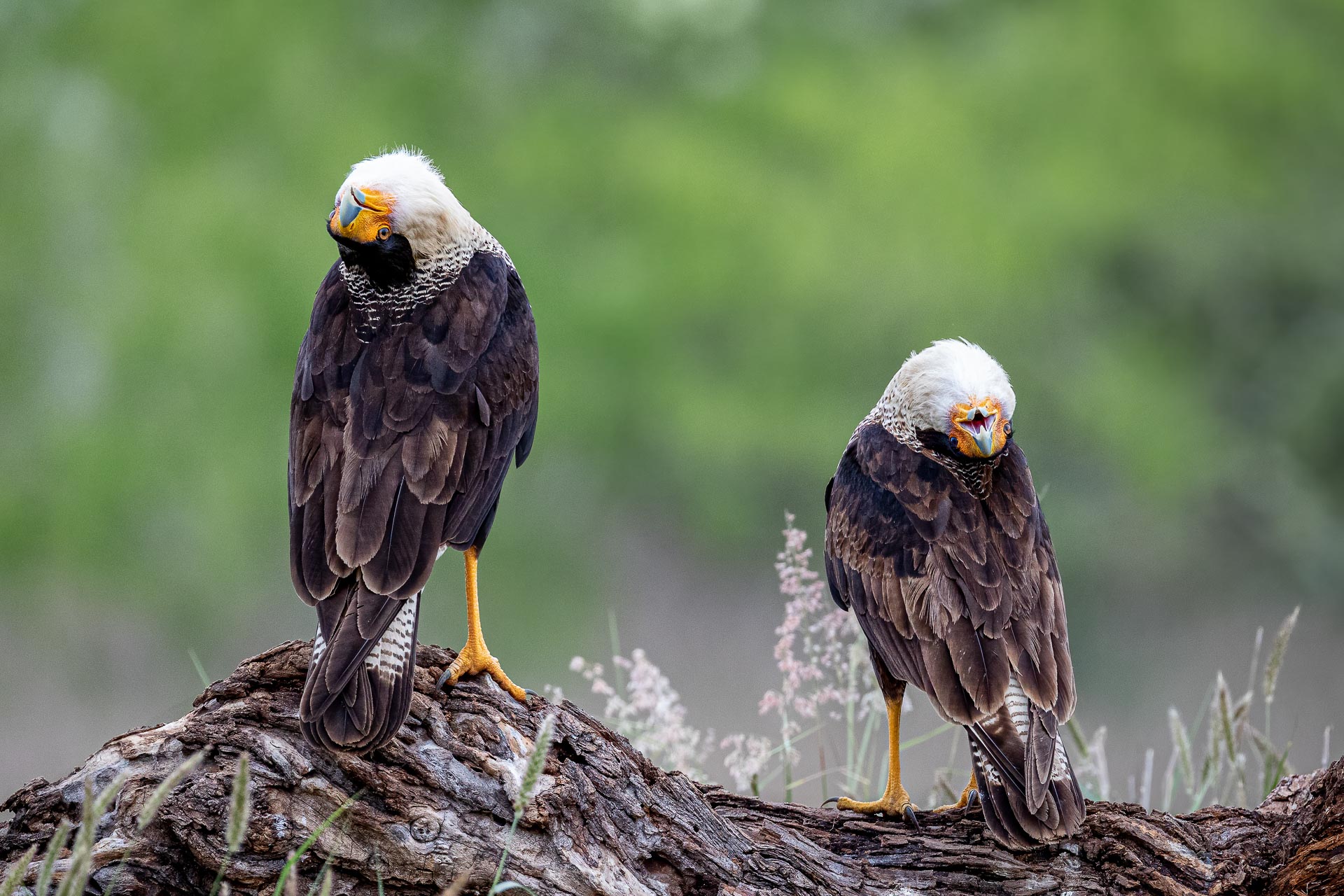
I travelled to the Rio Grande area in Texas to attend my first bird photography workshop. This image was taken from a hide where birds are fed regularly, and among the species attracted were Crested Caracaras. Most of the time they just sat around, so imagine my delight at being able to photograph these two individuals as they performed their mating behavior.
Taken with a Canon EOS 5D Mark IV with Canon 100–400mm f/4.5–5.6 II lens. Focal length 400mm; 1/500 second; f/5.6; ISO 2,000
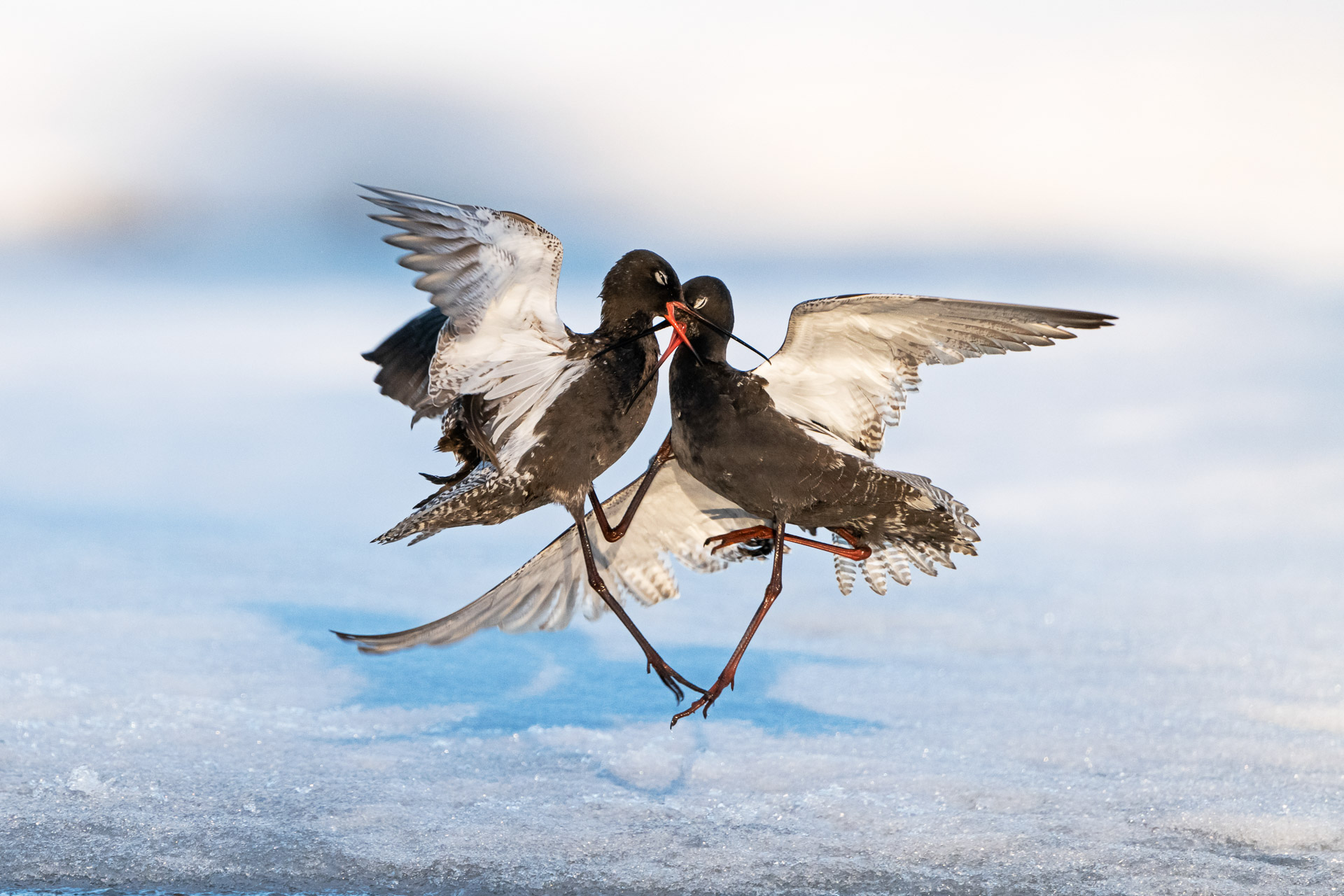
In 2020, spring was late arriving in Finnmark and there was still a lot of lingering snow when the first migratory birds arrived. As a result, there were only a few spots with open water on this particular river, and many waders gathered there in search of food while they waited for the snow to melt on their nesting grounds. I spent several days in my hide and was able to witness some interesting behavior, including brutal battles between rival males, perhaps fuelled by frustration at being snowbound. The most impressive took place between these two Spotted Redshanks.
Taken with a Nikon D850 with Nikon 180–400mm f/4 lens and 1.4x teleconverter. Focal length 550mm; 1/2,500 second; f/6.3; ISO 1,600.
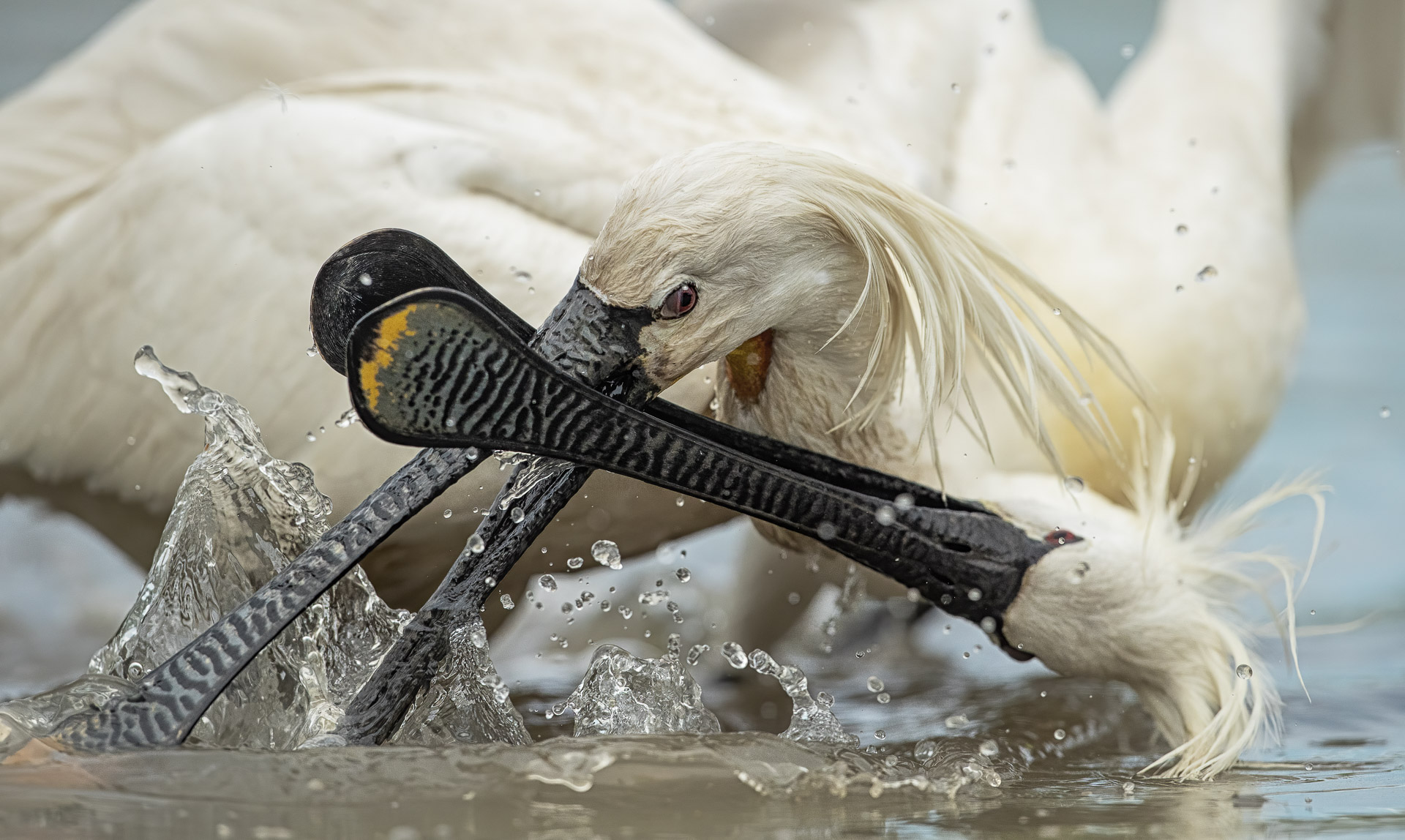
This image was taken on my second photographic session at this small pond. On my first visit there had been plenty of birds and lots of possibilities to take action photos. However, now the silence was my partner. All I had seen was a loneGrey Heron (Ardea cinerea) that attacked every bird that approached the pond. However, in the afternoon the situation had improved and a group of EurasianSpoonbills landed not far away from me. It was immediately noticeable that there was an aggressor among them, a bird that had very strong territorial instincts. I focused my attention and camera on this bird. In the vast majority ofc ases, the other spoonbills chose to avoid confrontation. However, in one instance there was a bird that turned to face the aggressor and a minute of unbridled fighting began.
The level of aggression the birds displayed was far beyond my imagination. I felt like they were fighting for their lives, as they pressed each other’s heads under the water or just grabbed each other’s legs and did not let their rival fly away. During the combat they were getting closer and closer to me, so by the time this picture was taken they completely filled the frame.
Taken with a Canon EOS-1D X Mark II with Canon 400mm f/2.8 lens. Focal length 400mm; 1/6,400 second; f/4; ISO 1,000.
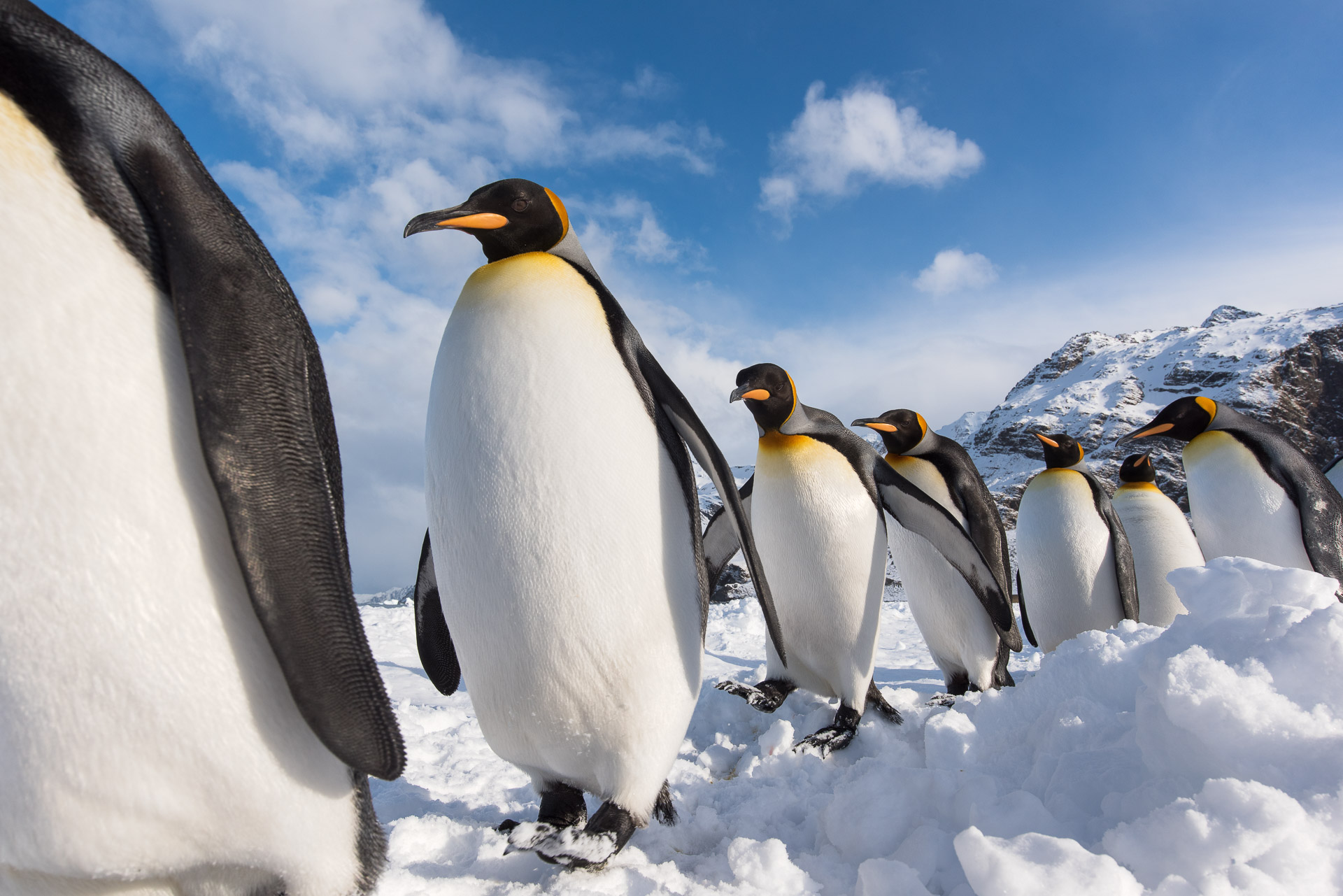
On land, King Penguins tend to be creatures of habit, and when moving from the sea to their nests they usually follow a well-trodden path. I took advantage of this behavior to capture this image, hiding a camera on the edge of one of these paths and camouflaging it with snow. I used a wireless trigger to take this shot of the birds as they paraded past in orderly single file.
Taken with a Nikon D810 with Nikon 18–35mm f/3.5–4.5 lens. Focal length 23mm; 1/500second; f/11; ISO 200.
Read more
Full frame vs cropped sensor for bird photography – which is better?
Best lenses for bird photography
Best Nikon camera
Best Canon camera
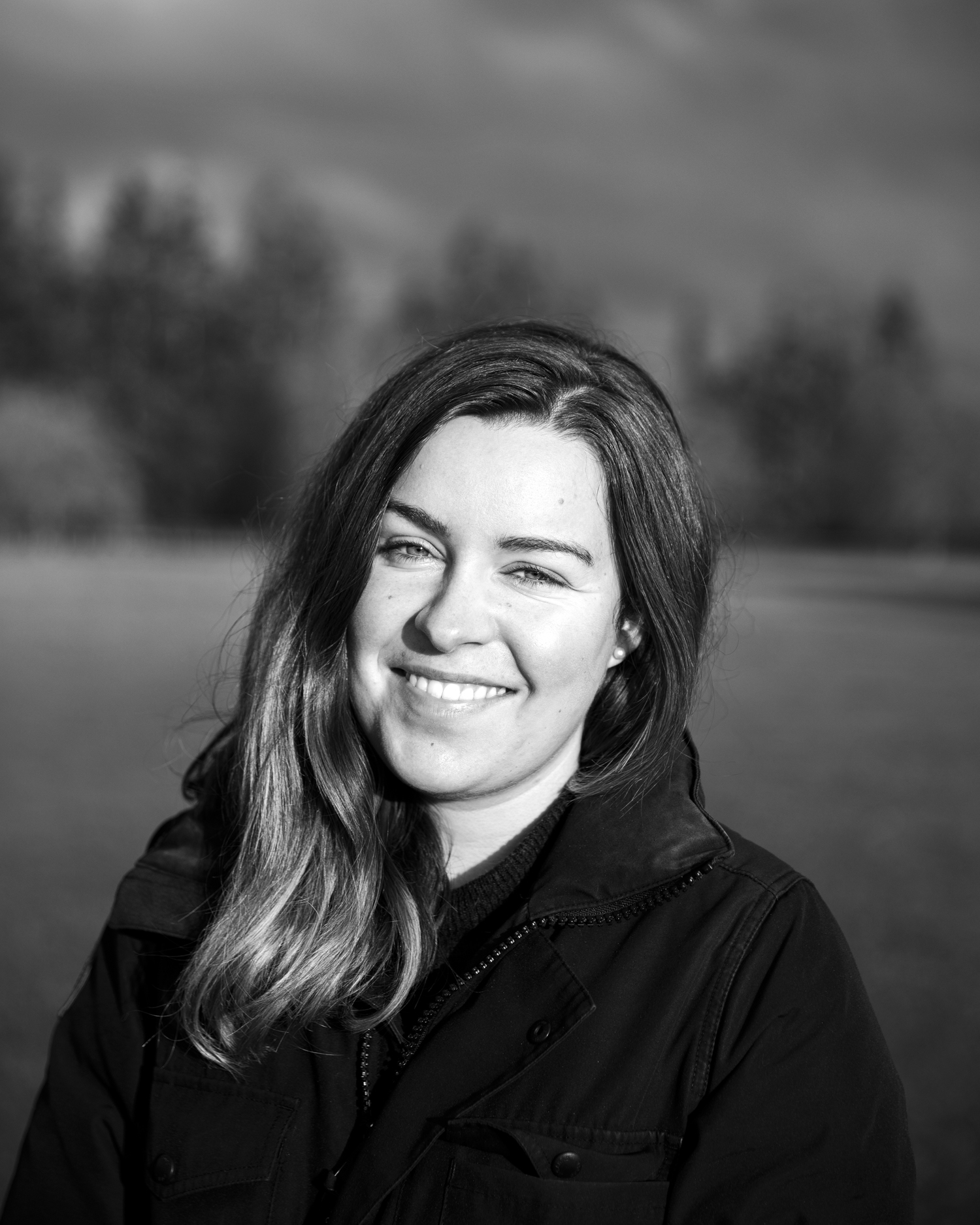
Lauren is a writer, reviewer, and photographer with ten years of experience in the camera industry. She's the former Managing Editor of Digital Camera World, and previously served as Editor of Digital Photographer magazine, Technique editor for PhotoPlus: The Canon Magazine, and Deputy Editor of our sister publication, Digital Camera Magazine. An experienced journalist and freelance photographer, Lauren also has bylines at Tech Radar, Space.com, Canon Europe, PCGamesN, T3, Stuff, and British Airways' in-flight magazine. When she's not testing gear for DCW, she's probably in the kitchen testing yet another new curry recipe or walking in the Cotswolds with her Flat-coated Retriever.
